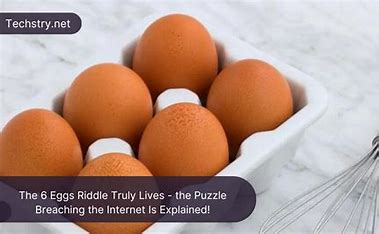If you are looking for a fun and challenging way to test your logic and math skills, you might want to try the I Have 6 Eggs Riddle. This riddle has been circulating on the internet and social media platforms, and it has left many people scratching their heads. The riddle seems simple at first glance, but it requires careful attention to detail and a good understanding of grammar and tense. In this article, we will explain the riddle and its answer, as well as some variations and alternative solutions.
The Riddle and Its Answer
The riddle goes like this:
I have 6 eggs. I broke 2, I cooked 2 and ate 2. How many eggs do I have?
Take a moment to think about it before reading further.
The answer to the riddle is **6**.
The Explanation
The reason why the answer is 6 is because of the way the riddle is worded. The riddle uses two different tenses: present and past. The first sentence, “I have 6 eggs”, is in the present tense, meaning that it is true at the current moment. The second sentence, “I broke 2, I cooked 2 and ate 2”, is in the past tense, meaning that it happened before the present moment.
The key insight is that the past tense actions do not affect the present tense situation. The riddle does not say that you broke, cooked and ate 2 of the 6 eggs that you have. It simply says that you did those actions on some eggs, which could be different from the ones that you have. In other words, you started with 6 eggs, did something with some other eggs, and still have 6 eggs.
Variations and Alternatives
The riddle can be modified by changing the numbers or the actions involved. For example:
– I have 10 eggs. I broke 3, I cooked 3 and ate 3. How many eggs do I have?
– I have 5 eggs. I boiled 2, I fried 2 and scrambled 2. How many eggs do I have?
– I have 8 eggs. I dropped 2, I cracked 2 and threw away 2. How many eggs do I have?
The answer to all these variations is still the same: the number of eggs that you have in the present tense. The past tense actions do not affect the present tense situation.
However, if the riddle changes the tense of the first sentence from present to past, then the answer will be different. For example:
– I had 6 eggs. I broke 2, I cooked 2 and ate 2. How many eggs do I have?
– I had 10 eggs. I broke 3, I cooked 3 and ate 3. How many eggs do I have?
– I had 5 eggs. I boiled 2, I fried 2 and scrambled 2. How many eggs do I have?
In these cases, the answer will be **0**. This is because the past tense actions do affect the past tense situation. The riddle says that you had a certain number of eggs, and then you did something with all of them. Therefore, you have none left.
Final Thoughts
The I Have 6 Eggs Riddle is a clever puzzle that tests your ability to think critically and analytically about the information provided. It is worded in such a way that it might initially seem complex or confusing, but upon closer examination, it is simply a matter of understanding the sequence of events and applying basic arithmetic to determine the outcome.
According to fresherslive.com, this riddle has been popular among people who are looking for a fun way to kill time during self-isolation or quarantine due to COVID-19 pandemic¹. It is also a good exercise for your brain and can help improve your grammar and math skills.
If you enjoyed this riddle, you might want to try some other similar puzzles that are trending on social media platforms². Some examples are:
– If Teresa’s daughter is my daughter’s mother, what am I to Teresa?
– A man dies of old age on his birthday. He was born on February 29th in a leap year. How old was he when he died?
– A woman shoots her husband then holds him underwater for five minutes before hanging him up to dry. Later they enjoy a wonderful dinner together. How can this be?
Have fun solving these riddles and share them with your friends and family to see if they can crack them too!

